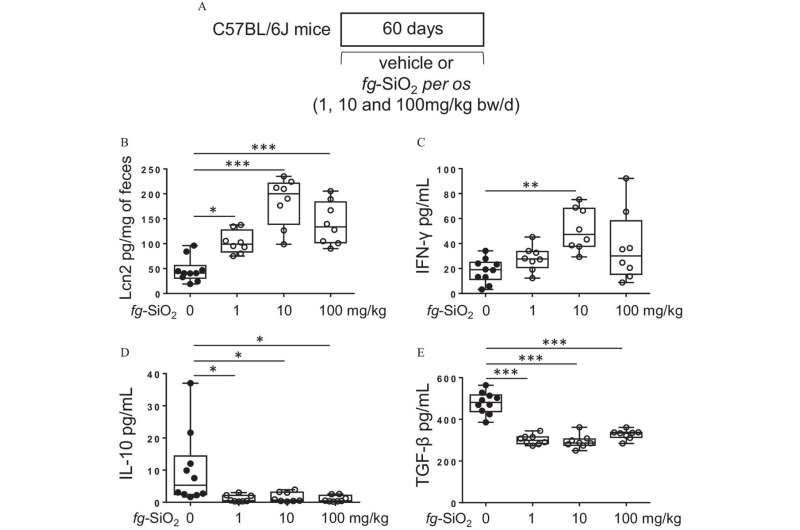This article has been reviewed according to Science X's editorial process and policies. Editors have highlighted the following attributes while ensuring the content's credibility:
fact-checked
proofread
Food additive E551 could promote celiac disease

E551, more commonly known as silicon dioxide, is a powder composed of nanoparticles (i.e., particles < 100 nm in size). It serves as an anti-caking agent in an array of dry and powdered foods, including soups, spices, cereal-based infant formula, instant coffee, cocoa mix, and freeze-dried pasta. It can be found among the ingredients of over 2,600 processed foods worldwide.
It prevents the formation of lumps, thus preserving food taste, texture, and stability. Additionally, E551 is widely used as an essential processing aid in various food transformation processes. In such situations, it does not appear in the ingredients list on the packaging, even if it is present in the final product. Thus, we are exposed to low doses of E551 on a daily basis via the food we consume.
Researchers at INRAE and McMaster University in Canada combined their expertise to explore whether this level of exposure could affect the intestinal immune system. More specifically, they explored the impact on oral tolerance to dietary proteins. The latter is a crucial nutritional function in which a tolerogenic response is induced in the intestine to block inflammatory immune reactions against the proteins we consume.
This system is operational from birth. Any disruptions can lead to the development of food sensitivities, which can take the form of allergic reactions (e.g., to peanuts, cow's milk, fish, shellfish, and eggs) or autoimmune conditions, such as celiac disease.
Celiac disease is a genetically linked autoimmune disorder that causes people to react to gluten, a protein in cereals such as wheat, rye, and barley. Symptoms include intestinal inflammation, abdominal pain, and diarrhea. Those afflicted may experience severe weight loss and nutritional deficiencies.
The prevalence of celiac disease is on the rise globally, but the reasons for this trend are opaque. In this study, researchers exposed mice to E551 on a daily basis for 3 months. They observed that the animals demonstrated lower oral tolerance to dietary proteins and, in tandem, greater levels of intestinal inflammation. The researchers also examined the underlying mechanisms.
They found that exposure to E551 reduced the number of intestinal immune cells responsible for producing the anti-inflammatory compounds needed to prevent gut reactivity. Using mice that express the celiac disease risk gene, the researchers then discovered that daily exposure to E551 worsened levels of the inflammation markers associated with the disease.
Taken together, these results indicate that chronic exposure to E551 via dietary sources could promote the development of celiac disease in people genetically predisposed to the condition.
This research is the first to underscore the potential toxicity of this food additive, which is currently considered to be safe for consumption.
To help ensure that potential concerns about E551 are considered during human risk assessments, the researchers used exposure methodologies that fit with the expectations of European and North American food safety agencies (European Food Safety Authority, Health Canada). More specifically, they used human dosages, incorporated the additive into food, and conducted longer-term experiments.
The study is published in the journal Environmental Health Perspectives.
More information: Bruno Lamas et al, Evaluating the Effects of Chronic Oral Exposure to the Food Additive Silicon Dioxide on Oral Tolerance Induction and Food Sensitivities in Mice, Environmental Health Perspectives (2024). DOI: 10.1289/EHP12758




















